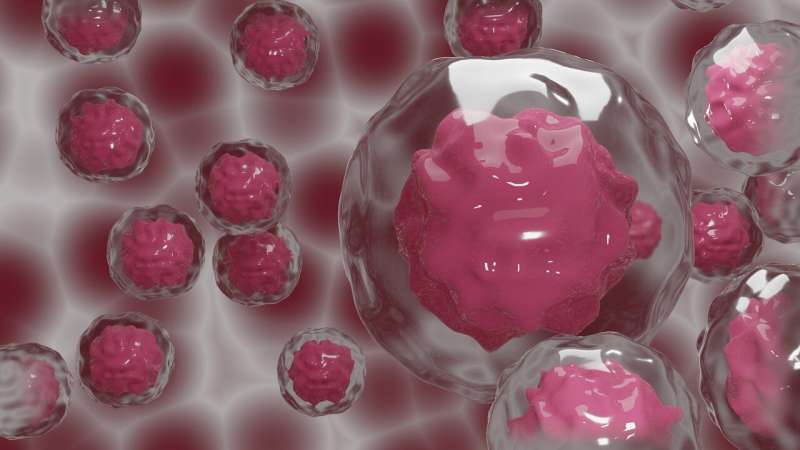Malaria drug could combat chemotherapy-resistant head and neck cancers

A new study suggests that the malaria drug hydroxychloroquine inhibits pathways that drive resistance to the chemotherapy agent cisplatin in head and neck cancers and restores tumor-killing effects of cisplatin in animal models.
The findings, published today in Proceedings of the National Academy of Sciences by University of Pittsburgh and UPMC scientists, pave the way for a clinical trial that combines cisplatin and hydroxychloroquine to treat chemotherapy-resistant head and neck cancers.
"When caring for patients with head and neck cancers, I often see chemotherapy fail. Cisplatin is a very important chemotherapy drug, but tumor resistance to cisplatin is a huge problem," said co-senior author Umamaheswar Duvvuri, M.D., Ph.D., head and neck surgeon at UPMC Hillman Cancer Center and professor of otolaryngology in Pitt's School of Medicine. "My lab is interested in understanding the mechanisms of resistance so that we can find better ways to treat these patients."
Previous research showed that a protein called TMEM16A is linked with cisplatin resistance in patient tumors. Overexpression of this protein, which occurs in about 30% of head and neck cancers, is also associated with decreased survival.
TMEM16A belongs to a group of proteins called ion channels. Straddling the cell's outer envelope, these proteins provide a passageway to chloride ions, which regulate muscle and nerve activation and transport of salt and water. Because impaired chloride transport is typically linked with neurological and kidney diseases such as epilepsy, cystic fibrosis and kidney stones, Duvvuri was surprised by the link between TMEM16A and cancer.
"It's always been a bit of a puzzle as to why an ion channel is upregulated in cancer," he said. "This research provides important clues towards solving this puzzle."
The new study suggests that TMEM16A promotes expulsion of cisplatin in cellular compartments called lysosomes. In a healthy cell, lysosomes act like a recycling and waste disposal system, breaking down molecules for reuse and expelling cellular detritus.
In tumors that overexpress TMEM16A, this protein drives a novel signaling pathway, boosting the production of lysosomes, which sequester and expel cisplatin from the cell, according to first author Avani Vyas, Ph.D., postdoctoral associate at Pitt.
"We show that cancer cells have an active mechanism to discard chemotherapeutic drugs," added co-senior author Kirill Kiselyov, Ph.D., associate professor of biological sciences at Pitt. "After dissecting this process on a fundamental level and identifying TMEM16A as a critical node, the next step was to test whether disrupting this process with hydroxychloroquine could have translational potential."
Hydroxychloroquine is an anti-malarial agent that inhibits lysosomal function. To evaluate its potential to treat cisplatin-resistant cancers, the team first implanted human cancer cells onto the membrane surrounding the embryo in fertilized chicken eggs.
They found that eggs treated with both hydroxychloroquine and cisplatin had greater tumor cell death than those treated with cisplatin alone.
Similarly, in mice with tumors derived from cisplatin-resistant human cancer cells, the combination of hydroxychloroquine and cisplatin slowed tumor growth more than either compound alone.
"These experiments suggest that hydroxychloroquine has a synergistic effect with cisplatin," explained Duvvuri. "This is relevant for patients because repurposing hydroxychloroquine, which is an existing drug, will allow us to translate these findings to the clinic much faster than we could with a novel compound."
The researchers are now designing a phase II clinical trial to treat head and neck cancer patients with a combination of hydroxychloroquine and cisplatin.
Other authors who contributed to this study were Roberto Gomez-Casal, M.S., Jonathan Pacheco, Ph.D., and Gerald R. V. Hammond, Ph.D., all of Pitt; Silvia Cruz-Rangel, Ph.D., of Pitt and UPMC; Hugo Villanueva, Ph.D., Baylor College of Medicine; Andrew G. Sikora, M.D., Ph.D., of The University of Texas MD Anderson Cancer Center; and Pavithra Rajagopalan, Ph.D., and Devraj Basu, M.D., Ph.D., both of the University of Pennsylvania.
More information: Lysosomal inhibition sensitizes TMEM16A-expressing cancer cells to chemotherapy, Proceedings of the National Academy of Sciences (2022). DOI: 10.1073/pnas.2100670119.



















